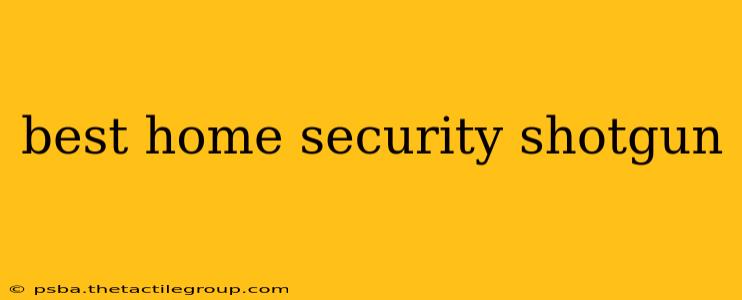Protecting your family and home is paramount, and a shotgun often ranks high on the list of preferred home defense weapons. But with so many options available, selecting the best home security shotgun can feel overwhelming. This guide cuts through the noise, offering insights to help you make an informed decision based on your specific needs and preferences. We'll explore various shotgun types, crucial features, and factors to consider before making your purchase.
Types of Shotguns for Home Defense
Several shotgun types excel in home defense situations. Understanding their strengths and weaknesses is critical:
1. Pump-Action Shotguns:
- Pros: Reliable, relatively inexpensive, and offer a high capacity. The manual operation provides a tangible sense of control, and malfunctions are typically easy to clear.
- Cons: Slower reload times compared to semi-automatic models, and the pumping action can be noisy, potentially alerting intruders.
Popular Pump-Action Options: Remington 870, Mossberg 500/590. These are legendary for their reliability and widespread availability.
2. Semi-Automatic Shotguns:
- Pros: Faster follow-up shots, allowing for quicker engagement of multiple threats. Less recoil than pump-actions, making them easier to control for some users.
- Cons: Can be more expensive than pump-actions and potentially more prone to malfunctions due to their complex mechanisms. Require reliable ammunition.
Popular Semi-Automatic Options: Benelli M4, Remington Versa Max, Beretta 1301. These models are known for their smooth operation and reliability.
3. Tactical Shotguns:
- Pros: Often feature specialized features such as ghost ring sights, shorter barrels for maneuverability in close quarters, and Picatinny rails for mounting accessories like lights and lasers.
- Cons: Typically more expensive than standard shotguns and may be overkill for basic home defense needs.
Key Features to Consider
Beyond the type of action, several key features significantly impact a shotgun's suitability for home defense:
-
Gauge: 12-gauge is the most common and powerful choice, but its significant recoil may be challenging for some users. 20-gauge offers less recoil but with reduced stopping power. .410 bore shotguns are generally less powerful and not ideal for home defense.
-
Barrel Length: Shorter barrels (18-20 inches) are more maneuverable in confined spaces, while longer barrels offer slightly improved accuracy.
-
Sights: Ghost ring sights are popular for their fast target acquisition in low-light conditions.
-
Capacity: Higher capacity magazines provide more rounds before reloading, offering an advantage in extended engagements. However, be mindful of local laws regarding magazine capacity.
-
Ergonomics: A comfortable and well-balanced shotgun is crucial for quick and accurate shot placement under stress.
Beyond the Weapon: Training and Preparation
The best home security shotgun is only as effective as its user. Investing in professional firearms training is essential. Practice regularly, focusing on safe handling, loading, unloading, and proper shooting techniques. Develop a comprehensive home security plan that includes escape routes and communication strategies.
Conclusion: Making the Right Choice
Selecting the best home security shotgun involves careful consideration of your individual needs, physical capabilities, and budget. Research thoroughly, handle different models, and seek expert advice before making a purchase. Remember, responsible gun ownership includes continuous learning and a commitment to safe and effective use. This information is for educational purposes only and should not be considered professional advice. Consult with local law enforcement and firearms instructors for further guidance.

